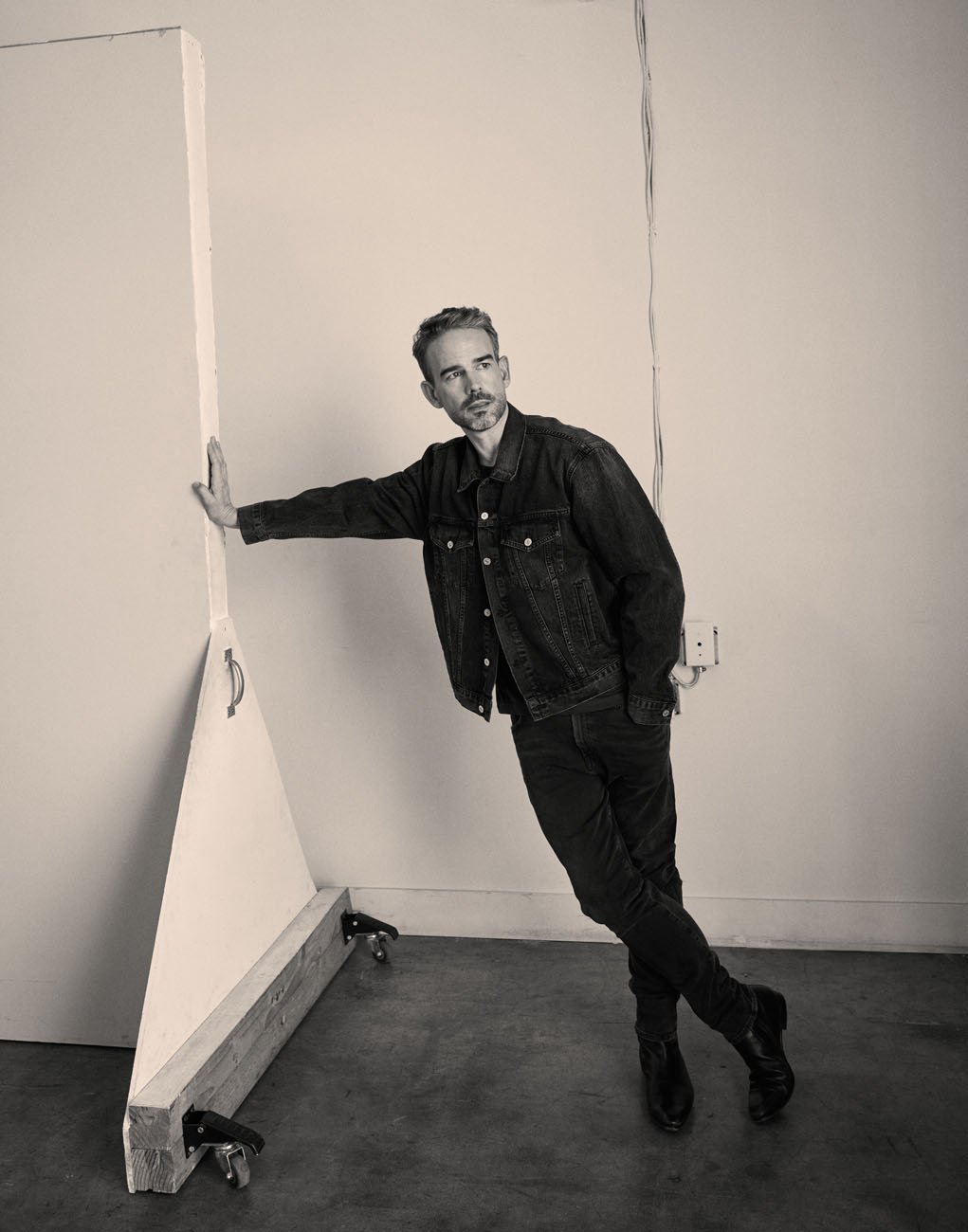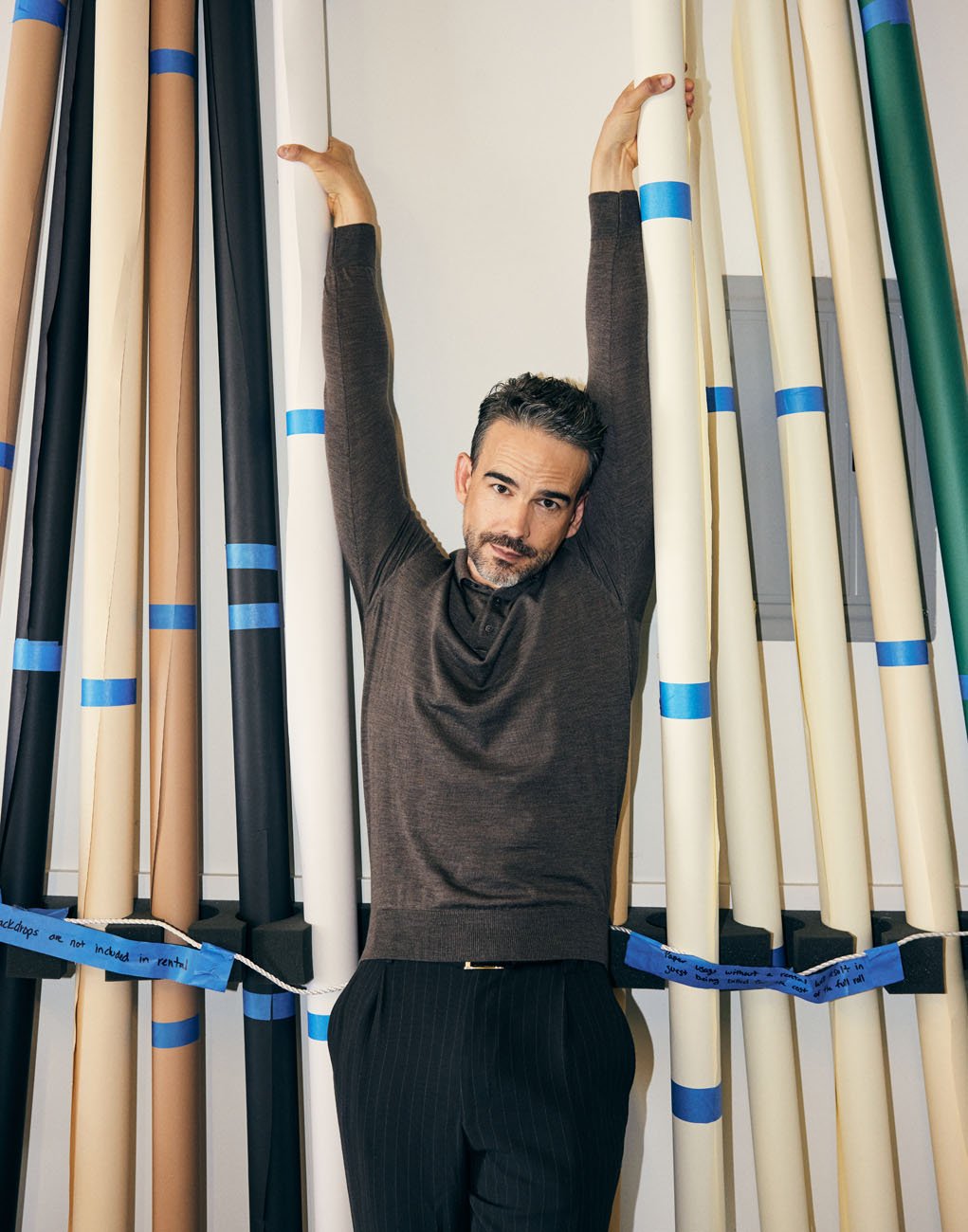Christopher Gorham
DISCLAIMER: We do not represent SAG/AFTRA or the WGA in any form. The following are individual opinions only. Please see the SAG/AFTRA or WGA websites for current information on the strikes. Read our #UnionStrong Statement here.
Interview by Kara Warner
Photography by Sami Drasin
Styling by Maddie Louviere
Grooming by Tammy Yi
While it's safe to say the majority of the members of the WGA and SAG-AFTRA (along with those who work in/around the entertainment industry) would have preferred to avoid going on strike, the guilds' collective actions this year have fostered a new sense of community, strength and solidarity among the entire working body of Hollywood.
"One of the things that the studios underestimated is how hungry we all are for that community, particularly after the pandemic," says actor Christopher Gorham, 49. "The only silver lining being that the strikes gave us that in-person community that we've all been missing so much."
Gorham has been working steadily as an actor for nearly three decades. The California native is also a local LA board member of SAG-AFTRA, a position he sought out to continue to give back to an industry he loves and to help support his fellow union members.
The actor spoke with JULY about his successful journey in Hollywood thus far, the rewarding aspects of being a part of SAG leadership, and why he's feeling optimistic about the industry's future.
When did you know you wanted to be an actor and how did you know you were on the right track?
I was really little, like in fourth grade, I grew up in Fresno, California with parents who were a school nurse and an accountant, so I was not a nepo baby who understood the business and really knew what I was getting into.
I feel like I've had the superpower of being a middle-class white man in America, meaning that I always feel like everything's going to work out because the privilege is real. And so I've always just kind of felt like it was going to work when I was young. Going into college, I got into UCLA's theater department, so that was an affirmation. And then once I was there, they started a conservatory program and we all had to re-audition and I got into that, so that was an affirmation. We did a showcase my senior year and I got an agent right off the bat, so that felt like I was on the right track. And then when I started auditioning, I was getting callbacks and the feedback was good, and then I would book a little thing here and there. And then by year three out of school I got my first series. And so I've been working pretty steadily since then.
When did you get your SAG card?
I got my SAG card on a movie. I can't talk about the project right now, but it was a tiny little part in a movie and it was so exciting. The two stars of the film that I worked with in my one little scene couldn't have been nicer and the director couldn't have been more welcoming. It was a wonderful experience, just a great first job. I must've been 22, 23, right out of college.
Is there one thing you've learned along the way that you pass along to others? Or a memorable piece of advice you carry with you?
One of the hardest parts of doing this as a career is the lack of control. There's so much about your career that you have no control over. Every time you're working on a job, you get asked multiple times, "Why did you decide to make this your next project?" And the truth of it is, with few exceptions, most of us aren't really choosing our next project. We're auditioning for just about everything and then we go do the next thing that we book. When I talk to young actors getting into the business, I tell them to be prepared for that, the lack of control. Because for actors like me coming in from Fresno or from somewhere outside the business, you really don't have an understanding of what the business actually looks like. And frankly, the business has changed so much since I started that building a career the way I was able to has become virtually impossible. And really that's one of the reasons that we've been on strike for so long.
How do you handle the downtime or idle time?
Well, I got married and had babies. That's what's kept me busy and motivated, was raising a family, but also it's something that was important to me, even as a young man, it's something that I knew that I wanted to do and I found a woman who wanted the same thing and then we just went ahead and got about it [Gorham is married to actress Anel López Gorham, they have three children 22, 19, 14]. So for me, that's been the thing that always has helped keep me grounded during the high times and then helped support me during the low times. And if ever I was thinking of or needing motivation to get back in there and keep going and keep working, all I had to do was look around my house.
Have your kids seen some of your work?
Generally they don't like to watch the stuff that I'm in, it's weird for them to see their dad not being their dad. And they often find it extremely embarrassing. It's fascinating to me in one sense because they've grown up so differently than I grew up. Nobody ever interrupted our family dinners to ask for a picture and an autograph with my mom or my dad. You never have my mom or dad doing super embarrassing things on TV that all of your friends were watching.
Any aspirations to join dad in the biz?
No, I think they've seen enough of it.
Can you talk about becoming a part of SAG leadership and what you get to do as a LA local board member?
I've been involved with SAG for a long time and often was one of the only series regular actors who was in these meetings. You hear people often complaining about this thing or that thing or why didn't they get this in the contract, but then when you ask, "Hey, did you go to the wages and working conditions meetings and tell them what was bothering you?" "Oh, no." I wanted to be a part of that, so I've been involved for a long time, but I haven't really felt like I had time to actually run for the board and be that involved. Now that my kids are older, I feel like I have a little more free time that I can devote to that. And then this year I was excited by the unity ticket. The leadership of our union has been kind of split between two factions since SAG and AFTRA merged, and this was the first year that the leadership kind of put that aside and said, "We're just going to run one ticket." And I felt like that was a great opportunity for me.
What do you do specifically in your new role?
One of the first things we had was a seven-hour Zoom meeting, which will really get people excited about participating [laughs]. But we have our convention coming up in October, and so along with the board members, also the people were delegates for the convention. And one of the things that delegates can do, so I was elected to delegate as well, and one of the things delegates get to do is propose resolutions for convention that they'll get voted on. And so it's a way for the membership to really directly be involved and make some changes. You can propose constitutional changes and then you can send advisory notices to the national board and you can set up committees, so you can really start to make real tangible change in the direction the union is going and really set priorities for the union for the next two years.
What we did in that really long Zoom is we went through all 126 resolutions that were proposed by the delegates, and we went through every single one and debated them on their merits and then decided how many of them we were going to endorse as a local board. I think we ended up endorsing 86 of them. And it was great. It was long, but it felt great to be involved and to really see firsthand how seriously all the board members took each resolution and really debated its merits. There are board members that have been involved for a long time who really have a lot of institutional knowledge about how the union works and what's been done already, which is really valuable. And then we had some new blood in there, like me, who are just bringing new and different ideas and a different working experience. We have board members who made careers as series regulars on TV like me, and then you've got board members who've worked mostly in film. You've got board members who are there representing background artists and stunt people and singers and dancers, because we cover a lot of different types of performers. So yeah, it was long, but really inspiring. I've been promised that all the meetings are not that long, but it was great.
What do you think of the WGA's deal?
They got a really good deal. When I saw the news on my phone, I texted my wife and then I started crying. I was overcome with emotion and my youngest was at the table with me and thought maybe grandma died or something. It's really emotional. The strike's been really hard. I felt like we finally are seeing the positive gains from that sacrifice. It shouldn't have to be this hard to be treated fairly. It's so frustrating and people really are being driven out of the business and out of the city by the strike. And so it's important that we get something that accomplishes what we set out to do, which was to preserve this industry, not just our jobs, but to preserve the industry because the way things were going, this whole industry was going to collapse, so it was actually really emotional and it felt for the first time it's like, okay, there's a light at the end of the tunnel because it's clear now that the AMPTP has finally come around that they're going to need to negotiate for real and in actual good faith and come to a fair deal.
How are you feeling about the future of the industry going forward?
I am optimistic, particularly since the WGA was able to make such a good deal that will help preserve the middle class in this business. If the AMPTP is willing to make a similar type of deal with SAG-AFTRA, then we're well on our way to restoring the middle class. And it's the same fight that you're seeing all over the country. It's the fight that the UAW is fighting in their strike. It's the same fight that the airline industry unions are fighting. It's the same fight that you see when Starbucks employees are unionizing or Amazon warehouses are unionizing. It's not just us. I think the whole country has felt the contraction of the middle class and it's so inspiring to see the popularity of unions rise again and it's so inspiring to see the widespread public support for our fight because we're all in this together at the end of the day and we just want what's fair.
✦











